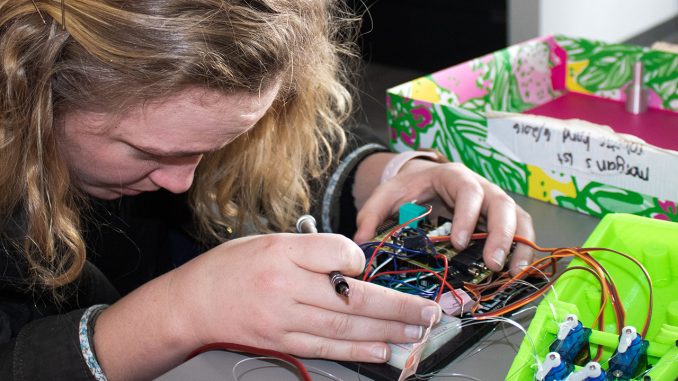
After Morgan Rollins’s fourth shoulder surgery, her soccer coach at Temple University asked her to make a choice.
It was between being able to hold her future children, or playing soccer for a couple more years.
“The fourth [sprain], I was just in my bed and I reached for my phone and it got to that point, and that was kind of a wake-up call,” Rollins said.
Inspired by her struggles with her own injuries, the sophomore bioengineering major quit soccer at the end of her freshman year to focus on her field of study. This semester, she started the university’s first prosthetics club, Temple Prosthetics and Orthotics, in which students collaborate with faculty and outside organizations to develop technologically advanced prosthetics.
The club aims to help students learn about prosthetics and provide free, individualized prosthetic limbs to amputees in the city by Fall 2019. Members hope to partner with patients and their doctors to create prosthetics that patients can customize the color, shape, size and activity they’re used for.
“A lot of people feel different and an outcast if they’re wearing prosthetics,” Rollins said. “We want them to be able to afford a prosthetic that’s high tech and something that they’re proud of.”
Rollins will reach out to doctors at nearby hospitals, like Temple University Hospital, who have patients in need of prosthetics. In addition to providing patients with prosthetics for free, Rollins hopes to supply doctors with the technology at low costs.
Prosthetics pricing varies greatly depending on a person’s needs, but a prosthetic leg can cost up to $50,000, according to the Alliance of Advanced Biomedical Engineering, a community of professionals in the biomedical field.
In Spring 2018, Rollins and some teammates won a $4,000 Creative Arts, Research, and Scholarship Program grant from the university to build a prosthetic arm. They worked on the project that summer while working in bioengineering professor Andrew Spence’s lab, which focuses on neuromuscular injuries and disorders. Spence serves as the Temple Prosthetics and Orthotics club’s faculty adviser.
During the project, more than 30 students of various majors reached out to Rollins to help, prompting her to form the club.
“We have a bunch of faculty support and everyone is very interested in actually making this happen, which is really, really fun to watch,” Rollins said.
As a high school junior, Rollins took anatomy and physics classes to pursue physical therapy. After experiencing depression from not having a physical therapist after her second surgery, she merged what she learned in class with biomechanics by working on a prosthetics project for class.
It involved 3D-printing a bionic arm coded to move at the press of a button. The following year, Rollins made a prosthetic leg for her gym teacher of 10 years who lost her leg from an infection.
Rollins was recruited by big-name universities including Harvard University, she said, but committed to Temple because of soccer.
“I like being part of something that is not just big, but is growing, and Temple in the past three or four years has just grown immensely,” she said.
Rollins enjoys that her club is full of students from a variety of majors, not just engineering, she said.
Emily Keitel, a junior early childhood education major and the club’s secretary, said people are surprised to find out she’s not studying engineering.
“What this club is about is helping people in the community get prosthetics,” she said. “Even though I won’t be a part of actually building any prosthetic, I still think it’s such a great thing to be a part of and a great cause.”
Spence hopes to instill in club members an enthusiasm to help others — a quality Rollins has, he said.
“Right from the start, she just gets up and does things and is fearless, in a good way,” Spence added. “She’s not afraid to try new things and if she doesn’t know stuff, she’ll go learn it.”
Rollins’ main focus for the club is giving prosthetics to those in need.
“I want to be able to get them prosthetics so they can carry on their lives, so they can lift their kids and play with their animals,” she said. “We want to help them by giving something they’re proud of and that works.”



Be the first to comment